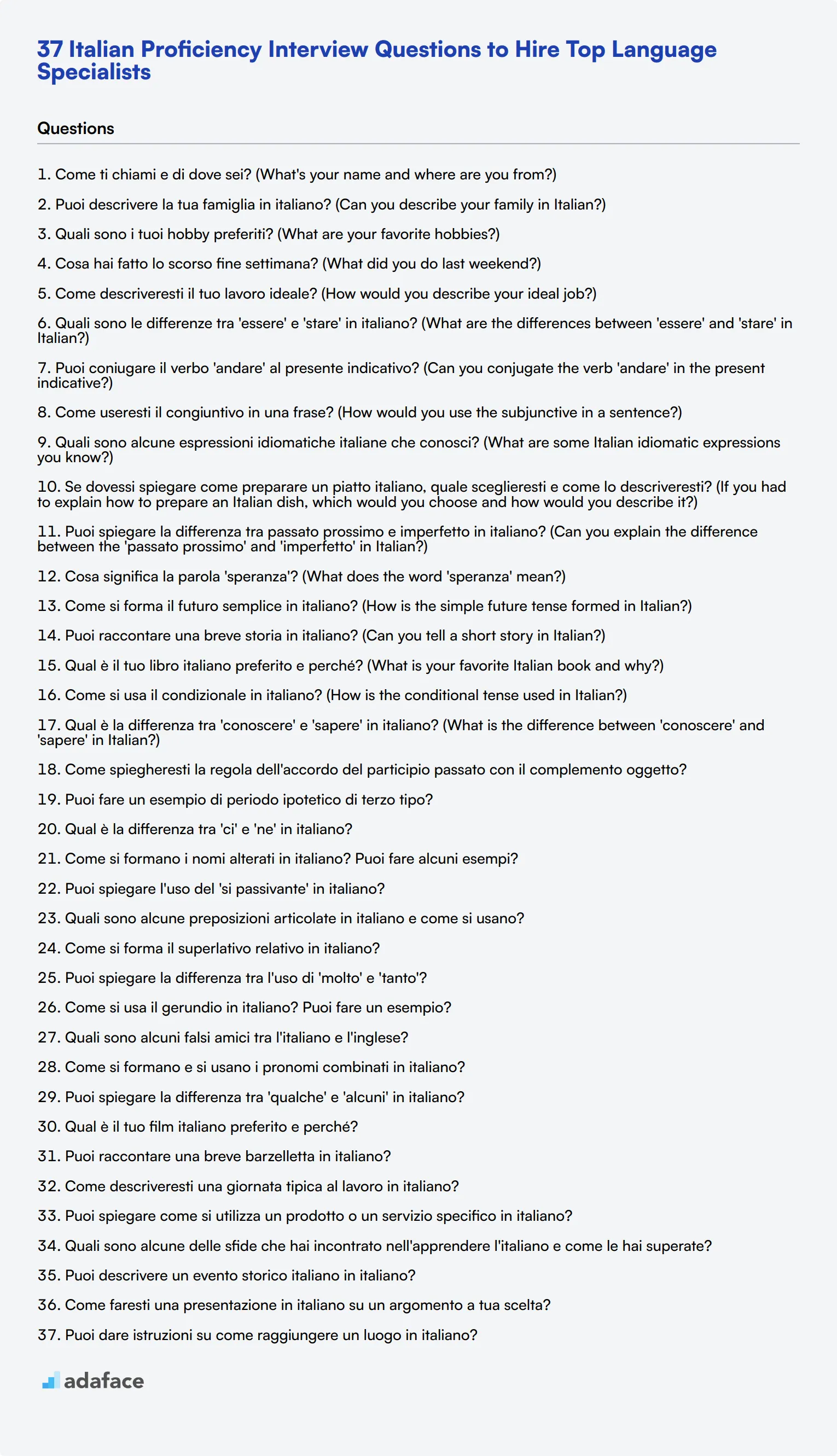Assessing Italian language proficiency is crucial when hiring for roles that require Italian communication skills. Conducting effective interviews helps identify candidates who can seamlessly integrate into Italian-speaking environments and contribute to your organization's success.
This blog post provides a comprehensive list of Italian Proficiency interview questions, categorized by skill level and language aspects. We cover basic questions, junior specialist evaluations, grammar and vocabulary assessments, and speaking and listening skills.
By using these questions, you can make informed hiring decisions and build a team with strong Italian language capabilities. Consider pairing these interview questions with an Italian proficiency test for a thorough evaluation of candidates' skills.
Table of contents
10 basic Italian Proficiency interview questions and answers to assess candidates

To assess candidates' basic Italian proficiency and language skills, use these 10 interview questions. They cover essential vocabulary, grammar, and conversational abilities, helping you gauge applicants' fundamental Italian knowledge quickly and effectively.
- Come ti chiami e di dove sei? (What's your name and where are you from?)
- Puoi descrivere la tua famiglia in italiano? (Can you describe your family in Italian?)
- Quali sono i tuoi hobby preferiti? (What are your favorite hobbies?)
- Cosa hai fatto lo scorso fine settimana? (What did you do last weekend?)
- Come descriveresti il tuo lavoro ideale? (How would you describe your ideal job?)
- Quali sono le differenze tra 'essere' e 'stare' in italiano? (What are the differences between 'essere' and 'stare' in Italian?)
- Puoi coniugare il verbo 'andare' al presente indicativo? (Can you conjugate the verb 'andare' in the present indicative?)
- Come useresti il congiuntivo in una frase? (How would you use the subjunctive in a sentence?)
- Quali sono alcune espressioni idiomatiche italiane che conosci? (What are some Italian idiomatic expressions you know?)
- Se dovessi spiegare come preparare un piatto italiano, quale sceglieresti e come lo descriveresti? (If you had to explain how to prepare an Italian dish, which would you choose and how would you describe it?)
7 Italian Proficiency interview questions and answers to evaluate junior language specialists
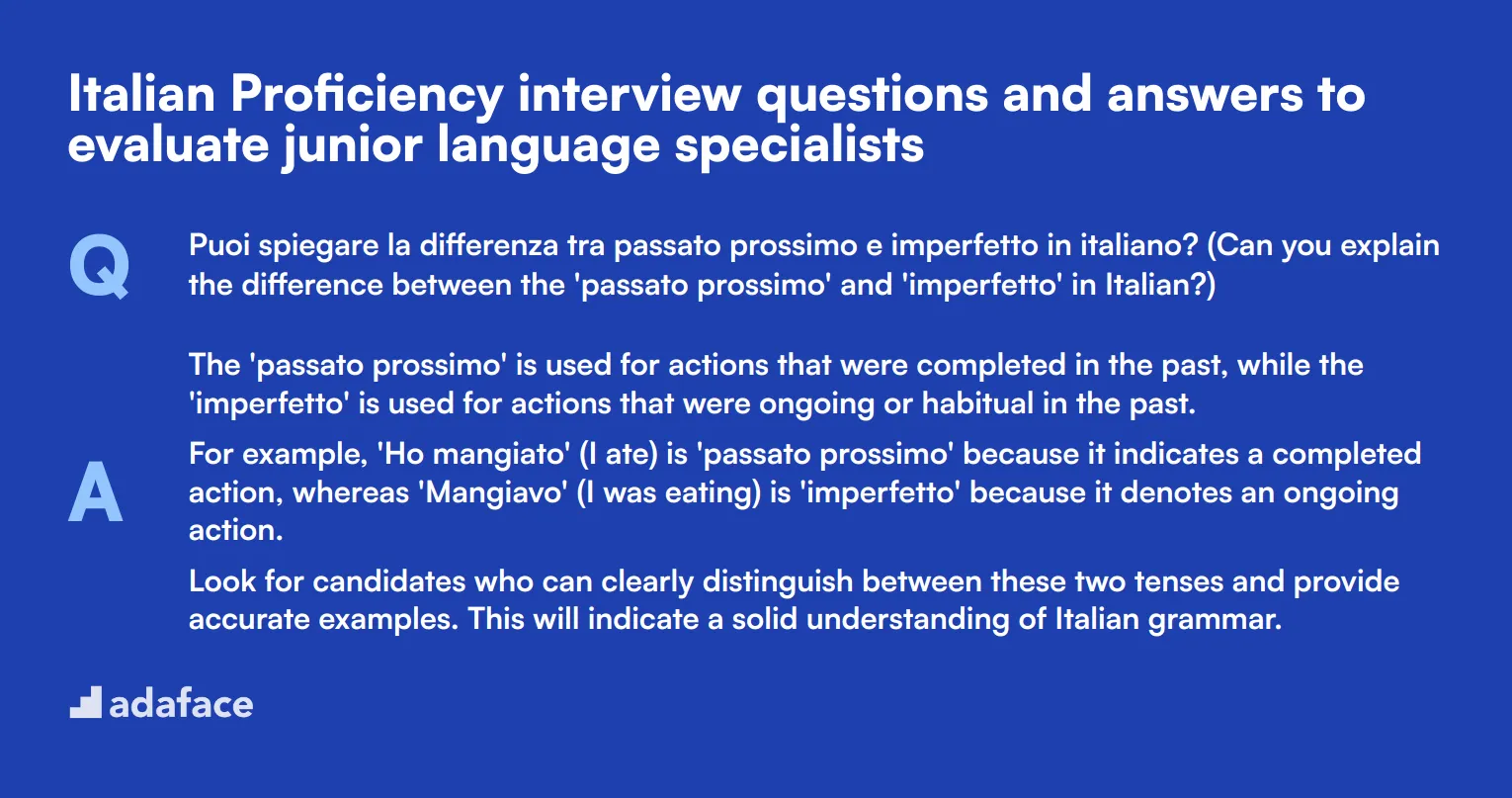
To assess the language skills of your junior Italian specialists, these targeted interview questions will help you gauge their proficiency effectively. Use this list during your interviews to ensure you cover essential areas such as grammar, vocabulary, and conversational skills.
1. Puoi spiegare la differenza tra passato prossimo e imperfetto in italiano? (Can you explain the difference between the 'passato prossimo' and 'imperfetto' in Italian?)
The 'passato prossimo' is used for actions that were completed in the past, while the 'imperfetto' is used for actions that were ongoing or habitual in the past.
For example, 'Ho mangiato' (I ate) is 'passato prossimo' because it indicates a completed action, whereas 'Mangiavo' (I was eating) is 'imperfetto' because it denotes an ongoing action.
Look for candidates who can clearly distinguish between these two tenses and provide accurate examples. This will indicate a solid understanding of Italian grammar.
2. Cosa significa la parola 'speranza'? (What does the word 'speranza' mean?)
The word 'speranza' means 'hope' in English. It is commonly used to express a desire or wish for something positive to happen in the future.
For instance, 'Ho molta speranza per il futuro' translates to 'I have a lot of hope for the future.'
An ideal candidate should not only provide the translation but also use the word in a sentence to demonstrate comprehension and usage.
3. Come si forma il futuro semplice in italiano? (How is the simple future tense formed in Italian?)
The simple future tense in Italian is formed by taking the infinitive form of the verb and adding the future tense endings. For regular verbs, these endings are -ò, -ai, -à, -emo, -ete, -anno.
For example, the verb 'parlare' (to speak) in the future tense is 'parlerò' (I will speak), 'parlerai' (you will speak), 'parlerà' (he/she will speak), 'parleremo' (we will speak), 'parlerete' (you all will speak), 'parleranno' (they will speak).
A strong candidate will correctly form the future tense and provide several examples, showcasing their grammatical knowledge.
4. Puoi raccontare una breve storia in italiano? (Can you tell a short story in Italian?)
Candidates should be able to narrate a brief story using appropriate vocabulary and tense. For example, 'Ieri sono andato al parco con il mio cane. Abbiamo giocato a lungo e poi siamo tornati a casa. È stata una giornata divertente.'
This demonstrates the ability to use past tenses and link sentences coherently.
Evaluate the candidate's fluency, coherence, and ability to use correct grammar. A well-structured narrative indicates a good grasp of language skills.
5. Qual è il tuo libro italiano preferito e perché? (What is your favorite Italian book and why?)
An ideal response might be, 'Il mio libro italiano preferito è 'Il Gattopardo' di Giuseppe Tomasi di Lampedusa perché descrive magnificamente il cambiamento della società siciliana nel XIX secolo. La scrittura è ricca e coinvolgente.'
This question helps gauge the candidate's exposure to Italian literature and their ability to articulate thoughts in Italian.
Look for detailed explanations that reflect the candidate's reading habits and depth of understanding of Italian culture.
6. Come si usa il condizionale in italiano? (How is the conditional tense used in Italian?)
The conditional tense in Italian is used to express actions that would happen under certain conditions. It is formed by taking the future tense stem and adding the conditional endings: -rei, -resti, -rebbe, -remmo, -reste, -rebbero.
For example, 'parlerei' means 'I would speak,' and 'mangerei' means 'I would eat.'
Candidates should show that they can correctly form and use the conditional tense in sentences. This demonstrates their understanding of hypothetical and polite expressions.
7. Qual è la differenza tra 'conoscere' e 'sapere' in italiano? (What is the difference between 'conoscere' and 'sapere' in Italian?)
'Conoscere' means to be familiar with someone or something, while 'sapere' means to know a fact or how to do something.
For example, 'Conosco Maria' (I know Maria) and 'So dove abita Maria' (I know where Maria lives).
An ideal candidate can distinguish between these verbs and use them correctly in context. This shows a nuanced understanding of vocabulary.
12 Italian Proficiency interview questions about grammar and vocabulary
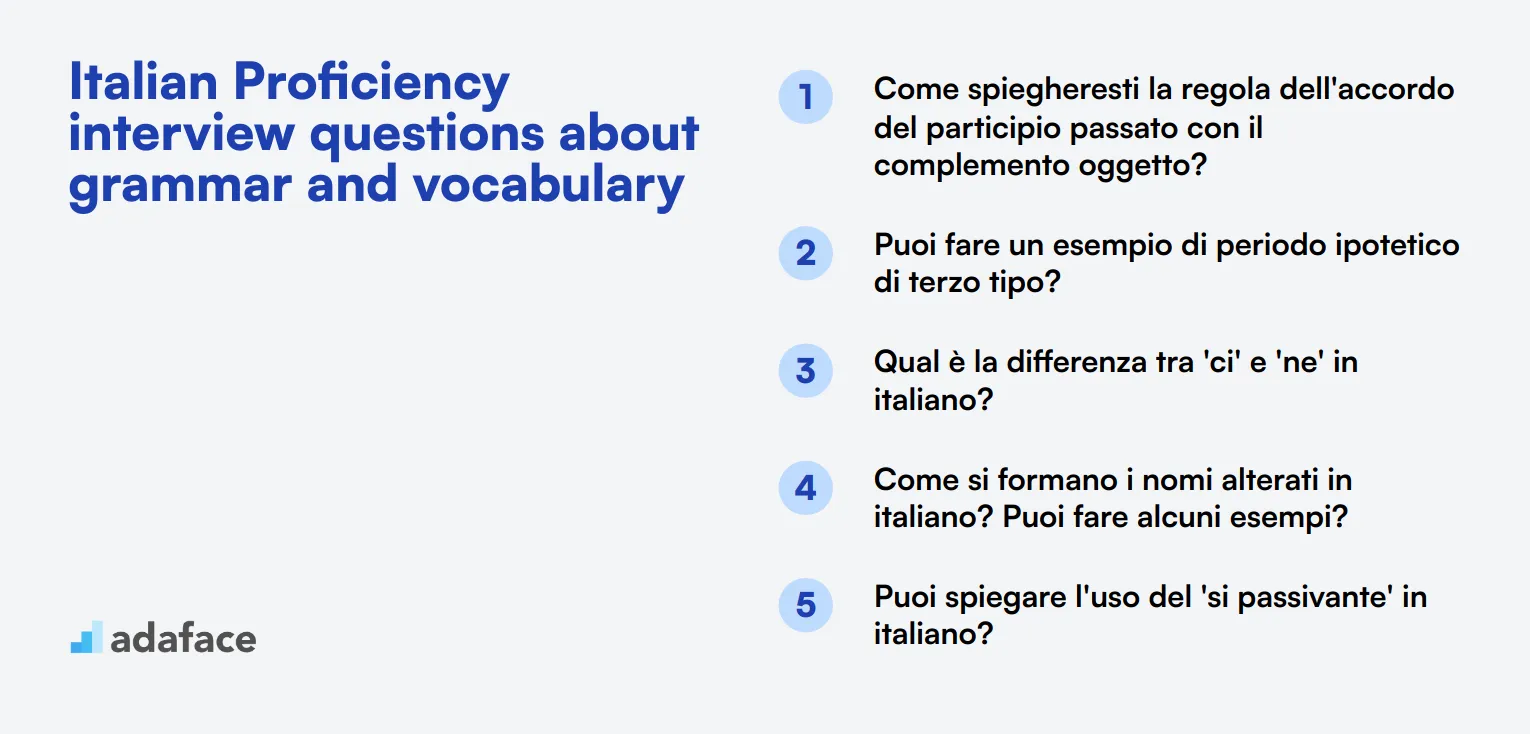
To assess a candidate's Italian proficiency in grammar and vocabulary, use these interview questions. They help evaluate the applicant's understanding of complex language structures and their ability to use Italian in various contexts.
- Come spiegheresti la regola dell'accordo del participio passato con il complemento oggetto?
- Puoi fare un esempio di periodo ipotetico di terzo tipo?
- Qual è la differenza tra 'ci' e 'ne' in italiano?
- Come si formano i nomi alterati in italiano? Puoi fare alcuni esempi?
- Puoi spiegare l'uso del 'si passivante' in italiano?
- Quali sono alcune preposizioni articolate in italiano e come si usano?
- Come si forma il superlativo relativo in italiano?
- Puoi spiegare la differenza tra l'uso di 'molto' e 'tanto'?
- Come si usa il gerundio in italiano? Puoi fare un esempio?
- Quali sono alcuni falsi amici tra l'italiano e l'inglese?
- Come si formano e si usano i pronomi combinati in italiano?
- Puoi spiegare la differenza tra 'qualche' e 'alcuni' in italiano?
8 Italian Proficiency interview questions and answers related to speaking and listening skills
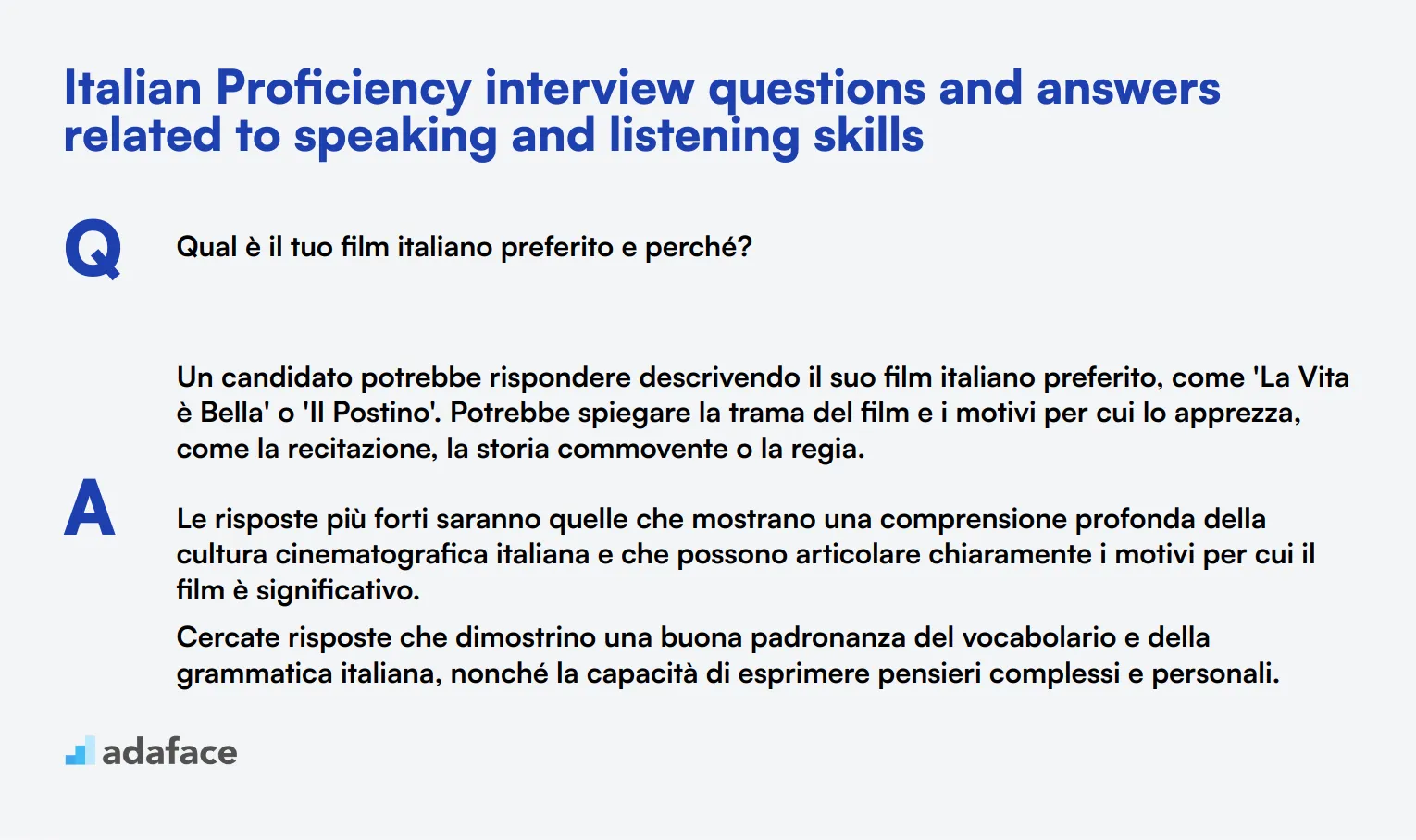
To assess your candidates' speaking and listening skills in Italian, use these practical interview questions. These questions will help you determine if applicants can effectively communicate in both everyday and professional settings.
1. Qual è il tuo film italiano preferito e perché?
Un candidato potrebbe rispondere descrivendo il suo film italiano preferito, come 'La Vita è Bella' o 'Il Postino'. Potrebbe spiegare la trama del film e i motivi per cui lo apprezza, come la recitazione, la storia commovente o la regia.
Le risposte più forti saranno quelle che mostrano una comprensione profonda della cultura cinematografica italiana e che possono articolare chiaramente i motivi per cui il film è significativo.
Cercate risposte che dimostrino una buona padronanza del vocabolario e della grammatica italiana, nonché la capacità di esprimere pensieri complessi e personali.
2. Puoi raccontare una breve barzelletta in italiano?
Un candidato potrebbe raccontare una barzelletta semplice e comprensibile, come 'Perché il matematico aveva paura del numero 7? Perché 7 8 9!'
La risposta ideale mostrerà che il candidato sa usare il linguaggio italiano in modo giocoso e naturale, il che è un segno di padronanza della lingua.
Cercate candidati che non solo raccontano la barzelletta correttamente, ma che riescono anche a farvi ridere, dimostrando un buon senso dell'umorismo e capacità di comunicazione.
3. Come descriveresti una giornata tipica al lavoro in italiano?
Il candidato potrebbe descrivere la sua routine giornaliera, menzionando attività come riunioni, gestione di email, collaborazioni con colleghi, e progetti specifici. Potrebbe anche parlare di pause caffè o di pranzi.
Una risposta articolata mostrerà la capacità del candidato di usare il vocabolario legato al proprio settore e di descrivere processi lavorativi complessi.
Cercate risposte che siano dettagliate e ben strutturate, mostrando una buona comprensione del lessico e delle frasi utili nel contesto lavorativo.
4. Puoi spiegare come si utilizza un prodotto o un servizio specifico in italiano?
Il candidato potrebbe descrivere come usare un'applicazione mobile, un software, o un prodotto fisico. Ad esempio, potrebbe spiegare come configurare un dispositivo elettronico passo dopo passo.
La risposta dovrebbe includere istruzioni chiare e dettagliate, dimostrando la capacità del candidato di comunicare informazioni tecniche in modo comprensibile.
Cercate risposte che siano precise e organizzate, mostrando la capacità di usare il linguaggio tecnico in modo accessibile e chiaro.
5. Quali sono alcune delle sfide che hai incontrato nell'apprendere l'italiano e come le hai superate?
Il candidato potrebbe parlare delle difficoltà con la grammatica, la pronuncia, o l'ascolto e come ha affrontato queste sfide con pratica costante, lezioni aggiuntive o immersione culturale.
Una risposta sincera e riflessiva mostrerà la determinazione del candidato e le sue strategie di apprendimento.
Cercate risposte che mostrino resilienza, capacità di problem solving e un approccio proattivo all'apprendimento delle lingue.
6. Puoi descrivere un evento storico italiano in italiano?
Il candidato potrebbe scegliere un evento come la caduta dell'Impero Romano, il Rinascimento o l'Unità d'Italia, fornendo una breve spiegazione dei fatti e dell'importanza storica.
La risposta ideale mostrerà una buona conoscenza della storia italiana e la capacità di esprimere informazioni storiche in modo chiaro e conciso.
Cercate risposte che siano ben informate e ben presentate, dimostrando sia competenza linguistica che culturale.
7. Come faresti una presentazione in italiano su un argomento a tua scelta?
Il candidato potrebbe scegliere un argomento come un progetto recente al lavoro, una ricerca accademica, o un'interesse personale, e descrivere come strutturerebbe la presentazione, includendo introduzione, punti chiave e conclusione.
Una risposta ben organizzata mostrerà la capacità del candidato di pianificare e comunicare informazioni in modo strutturato e coinvolgente.
Cercate risposte che includano strategie per mantenere l'attenzione del pubblico e per spiegare in modo chiaro i concetti complessi.
8. Puoi dare istruzioni su come raggiungere un luogo in italiano?
Il candidato potrebbe descrivere come raggiungere un ufficio o un punto di interesse, utilizzando indicazioni stradali chiare come 'prendi la seconda a destra' o 'cammina per tre isolati'.
La risposta dovrebbe essere chiara e dettagliata, mostrando la capacità del candidato di dare indicazioni precise e comprensibili.
Cercate risposte che siano facili da seguire e che utilizzino un vocabolario appropriato per le indicazioni stradali.
Which Italian Proficiency skills should you evaluate during the interview phase?
While it's impossible to assess every aspect of a candidate's Italian proficiency in a single interview, focusing on core skills can provide valuable insights. The following key areas are particularly important when evaluating Italian language proficiency during the interview phase.
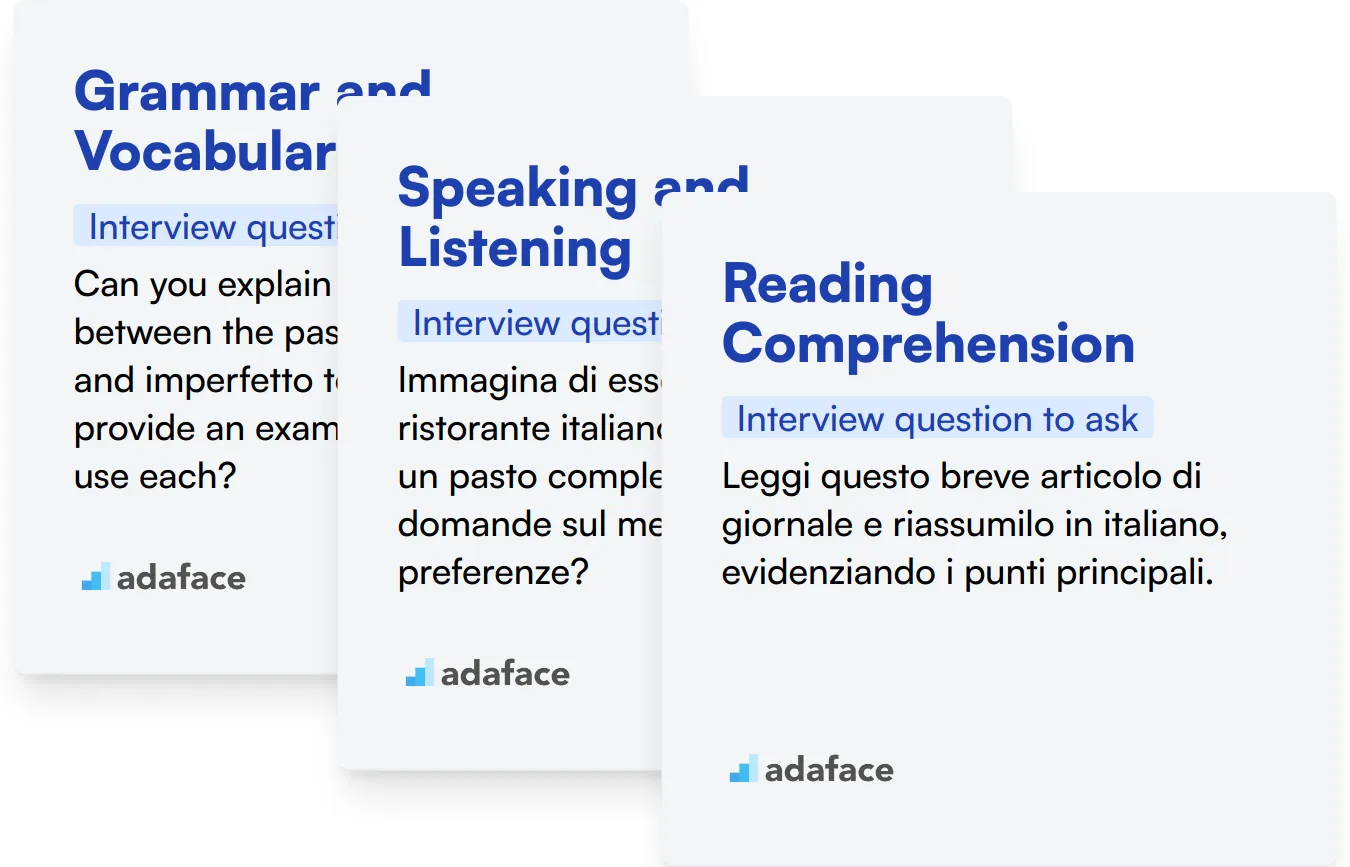
Grammar and Vocabulary
A strong grasp of Italian grammar and vocabulary forms the foundation of language proficiency. It enables candidates to construct sentences correctly and express complex ideas accurately.
Consider using an assessment test with relevant MCQs to evaluate grammar and vocabulary skills. This can help filter candidates based on their language knowledge.
During the interview, ask targeted questions to gauge the candidate's command over Italian grammar and vocabulary. Here's an example:
Can you explain the difference between the passato prossimo and imperfetto tenses, and provide an example of when to use each?
Look for a clear explanation of the tenses and appropriate examples. This question assesses both theoretical knowledge and practical application of Italian grammar.
Speaking and Listening
Effective communication in Italian requires strong speaking and listening skills. These abilities are crucial for real-world language use and interaction with native speakers.
To assess speaking and listening skills, engage the candidate in a conversation or role-play scenario. Here's a question to consider:
Immagina di essere in un ristorante italiano. Puoi ordinare un pasto completo, facendo domande sul menu e esprimendo preferenze?
Evaluate the candidate's ability to understand the question, respond appropriately, use correct pronunciation, and maintain a natural flow of conversation. Pay attention to their use of Italian restaurant vocabulary and cultural knowledge.
Reading Comprehension
Reading comprehension in Italian is essential for understanding written materials, from emails to complex documents. It demonstrates a candidate's ability to interpret and analyze Italian text.
To assess reading comprehension, provide a short Italian text and ask questions about it. Here's an example approach:
Leggi questo breve articolo di giornale e riassumilo in italiano, evidenziando i punti principali.
Observe the candidate's ability to quickly understand the text, extract key information, and summarize it coherently in Italian. This assesses both reading and speaking skills in a practical context.
Streamline Your Italian Hiring Process with Skills Tests and Targeted Interviews
When hiring for Italian language skills, it's important to verify candidates' proficiency accurately. This ensures you bring on board team members who can effectively communicate in Italian for your business needs.
A practical way to assess Italian language skills is through standardized tests. Consider using Adaface's Italian Proficient C1 Test or Italian Proficient C2 Test to evaluate candidates' abilities objectively.
After candidates complete the skills test, you can shortlist top performers for interviews. This two-step process helps you focus your time on the most promising applicants, making your hiring more effective.
Ready to improve your Italian hiring process? Sign up for Adaface to access our language tests and streamline your recruitment. For more information on our assessment platform, visit our online assessment platform page.
Italian (Basics/A1) test
Download Italian Proficiency interview questions template in multiple formats
Italian Proficiency Interview Questions FAQs
You can assess speaking skills by asking open-ended questions in Italian, requesting the candidate to describe scenarios, or engaging in a short conversation about a specific topic.
Key grammar points include verb conjugations, tenses, gender agreement, article usage, and proper sentence structure.
Play a short audio clip or video in Italian and ask the candidate to summarize or answer questions about its content.
Yes, including questions about Italian culture can help assess the candidate's overall knowledge and familiarity with the language context.
Adjust the complexity of vocabulary, grammar, and topics based on the expected proficiency level of the position you're hiring for.

40 min skill tests.
No trick questions.
Accurate shortlisting.
We make it easy for you to find the best candidates in your pipeline with a 40 min skills test.
Try for freeRelated posts
Free resources




